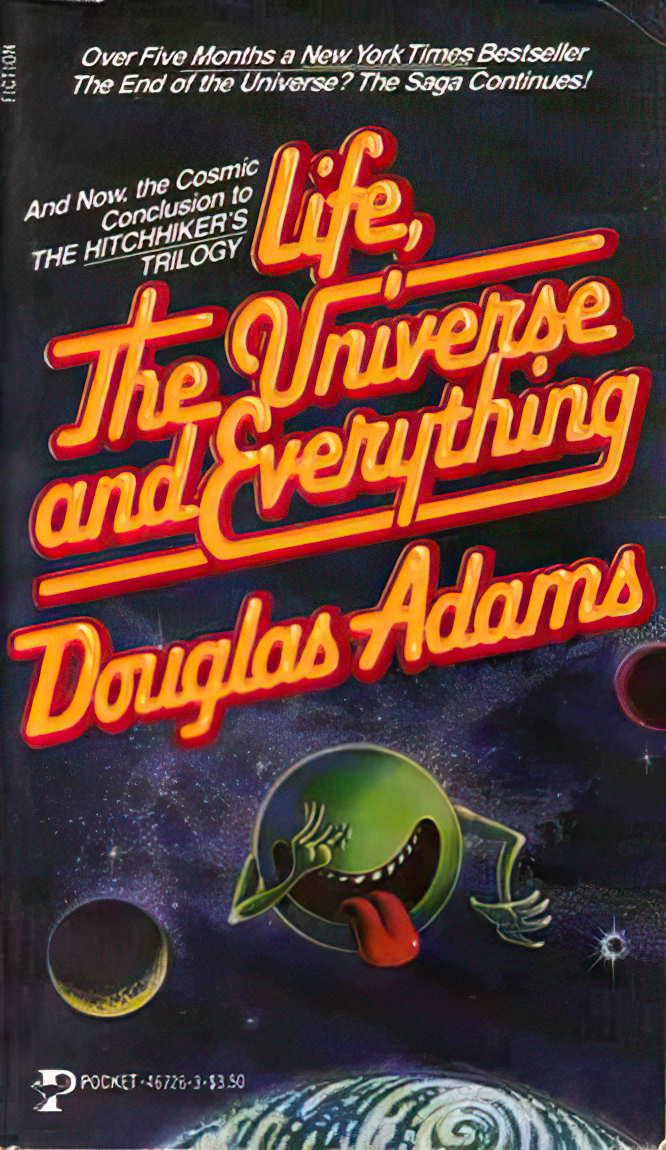 Story: Arthur Dent and Ford Prefect are rescued from years of mind-numbing isolation on prehistoric Earth by a freak time warp and a hovering, but nonetheless elegant, sofa. They wind up on Earth, at Lord’s Cricket Ground, a mere two days before the planet will be annihilated by the Vogons, but here they witness an alien incursion of another kind: killer robots from Krikkit descend upon the field to retrieve one piece of a key that could unlock their ability to destroy the entire known universe. Slartibartfast appears in his own unlikely spacecraft, the Bistromath, to whisk Ford and Arthur away on a desperate mission to stop the Krikkit robots from wiping out everything. It is a mission in which they will utterly fail.
Story: Arthur Dent and Ford Prefect are rescued from years of mind-numbing isolation on prehistoric Earth by a freak time warp and a hovering, but nonetheless elegant, sofa. They wind up on Earth, at Lord’s Cricket Ground, a mere two days before the planet will be annihilated by the Vogons, but here they witness an alien incursion of another kind: killer robots from Krikkit descend upon the field to retrieve one piece of a key that could unlock their ability to destroy the entire known universe. Slartibartfast appears in his own unlikely spacecraft, the Bistromath, to whisk Ford and Arthur away on a desperate mission to stop the Krikkit robots from wiping out everything. It is a mission in which they will utterly fail.
Review: For many years, I was convinced that – aside from “Mostly Harmless” – “Life, The Universe, And Everything “was my least favorite. I reread it recently during a bit of a Douglas Adams binge, and quickly discovered that – aside from “So Long And Thanks For All The Fish” – it’s actually my second favorite.
In the years since its publication, Adams has actually revealed a great deal about the origins of “Life, The Universe, And Everything”: the BBC wanted to make a third radio series out of the book but Adams couldn’t reconcile the end of the mild cliffhanger ending of the show’s second season with the beginning of this book, and the basic story outline actually came from an aborted Doctor Who script treatment Adams submitted under the title of Doctor Who and the Krikkitmen, which Adams found difficult to adapt to a Hitchhiker’s Guide structure because the Doctor would take action whereas Ford and Zaphod would be more inclined to go to a party (which is exactly what they do in this book). The bulk of the proactive story motion winds up coming from Slartibartfast (early on, which turns out to be a not-so-great fit for that character), Trillian (which finally gives the books’ most under-utilized character something to do, and something major) and Arthur.
Still, minor gripes aside, I found myself really digging “Life”‘s story structure. It builds up well, and by the time Zaphod makes his first appearance in the story, not only have we begun to miss the guy, but he adds to both the comedy and the drama. It think what pleasantly surprises me so much about “Life” is how well the drama fits into the mix alongside the comedy. Adams has hinted that had there been another season of the TV show, or a third radio series, this is what it would have been like. Fine by me! It has an interesting feel from putting plotting first and letting the humor come naturally from the characters. If this is what Hitchhiker’s would’ve been like on radio or TV in later seasons, we might still be getting the show now, or at least we might have continued to see it for several years. (There’s no telling with the BBC.)
Another favorite bit in Life is the showdown with Agrajag, a scene which is still riotously funny and terrifying at the same time, but something which was also tainted by its use to get out of “Mostly Harmless” in a big hurry. It’s hard to look at it in retrospect and get quite the same effect without cringing at how it resolved a couple of books later, but at the time, by itself, the Agrajag scene was a hoot.
Highly recommended stuff – this and “So Long” were as good as Hitchhiker’s got after the first book.
Year:
Author:
Publisher:
Pages:




